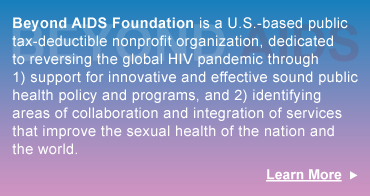SCHWARZENEGGER URGED TO SIGN BILL PERMITTING CONDOMS FOR CALIFORNIA'S PRISONERS
The letter below was faxed to Governor Schwarzenegger on September 15, 2006. Beyond AIDS has supported California's Assembly Bill 1677 (Koretz) since it was introduced in 2005.
Honorable Arnold Schwarzenegger
Governor, State of California
State Capitol Building
Sacramento, CA 95814
RE: PLEASE SIGN AB 1677
Dear Governor Schwarzenegger:
The Board of Beyond AIDS reaffirms its support for AB 1677 as a step forward for public health. We urge a signature on this bill.
The prevalence of HIV infection in state prisons is much higher than in the general community, and many inmates become infected while in prisons and return to the community to infect spouses and other sexual partners. One of the most frustrating problems in trying to control HIV transmissions in California’s correctional facilities (both state and local) has been the prohibition of condom distribution and possession by inmates.
Among the reasons cited by wardens for prohibiting condoms have been questions about the legality of condom distribution, because it might be interpreted as encouraging (“aiding or abetting”) sexual activity among the inmates, which in the case of all-male facilities would be sodomy by definition, a misdemeanor. (This is despite the high probability that the penal code provisions on sodomy and oral copulation by inmates are unconstitutional, based on recent Supreme Court actions). Such thinking has even led to prohibition of condoms at Atascadero State Hospital, which accepts mentally ill inmates transferred from state prison but is an all-male facility, whereas the other state mental hospitals do distribute condoms because they either do not receive inmates, or receive only female inmates.
This bill will permit health departments and AIDS organizations to distribute condoms. Equally important, it will make clear for the first time that the distribution and possession of condoms in correctional facilities is legal. It is likely that many lives will be saved, both those of the inmates and those of spouses/partners in the community who are currently being unknowingly infected with HIV and other serious diseases after inmates are released.
Based on my personal experience with HIV prevention in incarcerated populations, many inmates are likely to accept and use condoms if sexual activity is already going on or is inevitable. Many inmates are pressured into sexual activity, but can negotiate the use of condoms by those pressuring them. Their current inability to obtain condoms is an injustice that subjects them to the risk of acquiring a fatal but preventable disease.
Thank you for your attention to this important life-saving issue. I have personally been promoting this measure for 12 years, working in part through the California Medical Association. I encourage you to
note the record of support of that organization for this bill, which I have reaffirmed as current as of yesterday, even though their current policy limits their letters to the Governor to bills that CMA is actually sponsoring.
One limitation of the effectiveness of this bill is that outside agencies will not be available all the time when condoms are needed. Many prisons are in remote areas, far from AIDS prevention organizations, and the only resource available would be the local health department, which would not have a budget for this activity. Therefore, in addition to signing this bill, we encourage you to ask the Department of Correction and Rehabilitation to begin its own distribution of condoms as part of HIV education in prisons, so availability will not be restricted in small counties and in remote prisons that do not have practical access to the services of nonprofit organizations.
Sincerely,
Ronald P. Hattis, MD, MPH
Secretary, Beyond AIDS
(See “Reply to” address above)
(888) BEY-AIDS
![]() Return to Archived Articles and Letters
Return to Archived Articles and Letters

